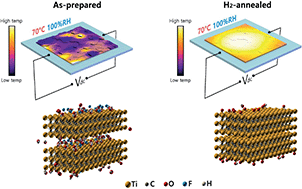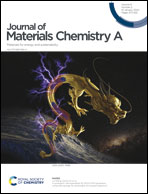Oxidation-resistant titanium carbide MXene films†
Abstract
Two-dimensional transition metal carbides (MXenes) have attracted much attention due to their excellent electrical conductivity and outstanding performances in energy storage, telecommunication, and sensing applications. It is known that MXene flakes are readily oxidized in either humid air or aqueous environments. While the chemical instability of MXenes may limit their use in applications involving ambient environments and long-term operation, oxidation behaviour of MXene films has not been addressed. In this work, we demonstrate a hydrogen annealing method to increase the oxidation stability of Ti3C2 MXene in two different aspects: (1) dramatic improvement in the oxidation stability of pristine MXene films against harsh conditions (100% relative humidity, 70 °C), and (2) large recovery in the electrical conductivity of previously oxidized Ti3C2 MXene films. We also demonstrate an electric-field-induced heater capable of stable operation under highly oxidizing conditions, based on the oxidation-resistant MXene film. A total loss of heat generation ability was observed for the as-prepared MXene film, while the hydrogen-annealed one maintained its bright infrared radiation, under the highly oxidizing conditions. This work offers a solution to industrial applications of unprotected MXene films, securing their stable and long-term operation in humid conditions.

- This article is part of the themed collection: Journal of Materials Chemistry A Lunar New Year collection 2021


 Please wait while we load your content...
Please wait while we load your content...